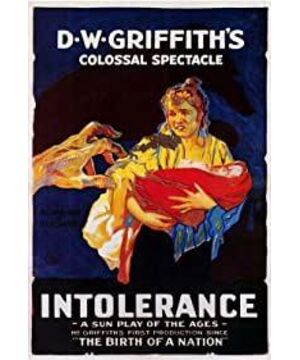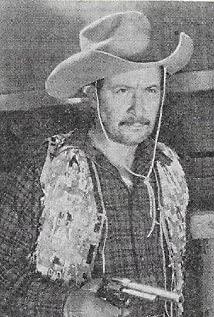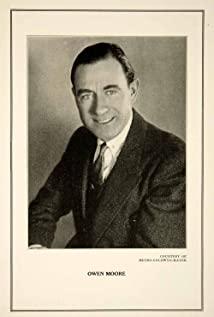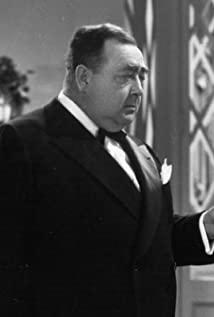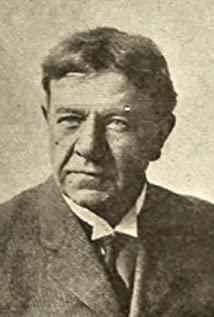Since the birth of the movie, it has gone through a history of more than 100 years. Standing in the present and looking back a hundred years ago, there are always some movies that are not to be missed classics, and there are always some movies that are worth discussing and remembering repeatedly. Among them, "Party Commonwealth and Diversity" is such a work.
In 1916, the famous director David Griffith released one of the most controversial films of his life. After the film was released, it formed a situation of losing both the box office and the audience's word of mouth. People shouted that the time was long and the plot was inexplicable.
But in the following decades, the film has been sought after by countless directors and has been praised unanimously. Director Orson Welles said: "This failure is also the greatest success in the history of cinema."
01 A masterpiece misunderstood by the audience, an "epic movie" in which three tragedies are connected by a real story
Director David Griffiths, born in Kentucky in 1875, became a director in 1908 and has shot more than 500 short films. Before, he has been working as a photographer and screenwriter in a film company. His favorite writer is Dickens. He has adapted a large number of novels into films, and is known as the "father of film creation" by later generations.
"Party to Fight Differing" is Griffith's filming career, which cost a lot of money and spent countless efforts. The filming time was one and a half years, the production cost of 2 million US dollars, and more than 60,000 actors were used. The original version was 480 minutes long, and the finished film was 220 minutes. This was unique in the silent film era a hundred years ago, but the failure at the box office directly led to the fact that he has been repaying the debt for this film for the rest of his career.
The film consists of 4 stories, mainly describing the experiences of a young couple after a conflict between labor and capital in a factory in the early 20th century in the United States. At the same time, three other historical stories are interspersed in the story, namely: "The Passion of Christ", "The Night of St. Bartholomew" and "The Fall of Babylon".
It can be seen that in the story of real life in the United States, the judge immediately rushed to the execution scene after learning the real murderer. The hero was rescued at the end of the story, while the other three historical stories all had tragic endings. . It can be said that the whole movie is a story with a happy ending, connecting three "classic tragedies" in history.
When it comes to "tragedy", the history can be traced back to the ancient Greek period. There are mainly three people who are regarded as the three tragic poets (or masters) of ancient Greece by later generations, namely: Aeschylus, Sophocles and Euripides s. There is an inseparable connection between the three classic tragedies in the film "Party to Fight Differing" and the works of these three masters.
Aristotle: "Tragedy is a kind of imitation of serious and complete behavior with great significance." "Tragedy can cultivate emotions and have a good influence on social morals."
Modern people commented on "Party Fighting Against Differing", thinking that it was a "avant-garde film" in the history of film. The evaluation also starts from the groundbreaking shooting and editing techniques, and the reflection on the war, but few people touch on the textual origin of the story. So today I want to discuss with you how the three tragic stories of the film are related to the "ancient Greek tragedy" a thousand years ago.
02 The tragedy of "God", different cultural backgrounds, the same benefits for mankind
The writer Aeschylus was born in 525 BC to a noble father, and around 484 BC, he began to participate in the local drama creation competition held in Athens. The main works of Aeschylus in the present life include "The Seven Generals Attacking Thebes", "Prometheus", "Agamemnon", "The Liberator", "Vengeance" and so on.
The "Prometheus" trilogy includes "Prometheus Bound", "Prometheus Making Fire", and "Prometheus Unleashed". The story describes that "God Prometheus" helped his brother "God Zeus" to win the war, but Zeus hated humans and wanted them to be extinct, but Prometheus chose to sympathize and help humans.
So he privately stole the "fire" from the sky and gave it to human beings, and also imparted knowledge of science, writing, medicine and other knowledge to human beings, so that people have wisdom. Zeus was very angry when he found out. He tied Prometheus to the rocky cliff of the Caucasus Mountains, and his heart was eaten by vultures every day, but he would not die. Until he was rescued by the hero "Hercules".
"Prometheus" is one of Aeschylus' masterpieces. His works mainly describe the early Athenian slavery society, mainly describing the legendary Greek "gods", praising the great heroes who serve the country and the people, and oppose slavery. The persecution of the Lord. The writer used this story to criticize the autocratic system and brutal nature of the ruling class in Athenian society at that time.
On the other hand, the first tragedy in the film is the story of the crucifixion of "Jesus Christ". The Jesus Christ in the story was originally a Jew. His name was Pontius Pilate. According to legend, he could turn water into wine at a wedding, avenge wrongful women, and heal children. He was a practitioner, but was arrested by the Jewish nobles in a conspiracy, and was finally nailed to the cross.
The text behind the story of "The Passion of Christ" in the movie is Aeschylus's "Prometheus". The director uses this story to let people see the tragedy of "God". The director subtly showed the common "divine nature" of human civilization in the film. It can also be seen at the end of the film that the gods and human beings are "in the same frame".
Through this text, the director wants to tell the audience that the "Jesus Christ" in the film is also the legendary "God". He is a god like Prometheus; they also care about human beings, bring enlightenment and salvation to human beings, bring Wisdom and love; also suffered injustice.
The tragedy of "God" stems from the benefit of mankind, the ordination of mankind, and the selfless love to teach everyone to put away their personal desires.
03 The tragedy of "kingdom", hegemonism cannot tolerate any "opposition", and the means of excluding dissidents are cruel and bloody
The second tragedy of the film is "Night of St. Bartholomew," which describes a real event in history. On August 24, 1572 in Paris, France, Catholic rioters brutally massacred the Protestant "Huguenots" (also translated as "Huguenots"), which lasted for several months and killed more than 70,000 people people, known as the "Massacre of St. Bartholomew".
Behind this massacre was a religious war to exclude dissidents, which was triggered by the then French queen dowager Catherine de' Medici. As a Catholic, Catherine, disregarding the well-being of her daughter Margaret, imprisoned her son-in-law, Henry IV, the Protestant King of Navarre, and used her motherhood to force her son, Charles IX, to slaughter ordinary Protestants.
The background of this incident was that in Europe at that time, Martin Luther, a church person, advocated the "Protestant" reform. Because of the support of a large number of people, the "kingship" of Catholicism was greatly shaken. This reform also caused the beliefs of the emperors of European countries to sway from left to right.
The same goes back to Sophocles, one of the Greek tragic poets. He was born in 496 BC, and his father was an arsenal factory owner. Most of his works are stories about kingship and power, such as: "Ajax", "Oedipus the King", "Oedipus at Colonus", "Antigone", "The Thorn" Cass Girl, etc. Among them, "Antigone" is the last of Thebes' trilogy and is recognized as one of the greatest works in the history of theater.
The story describes the two sons of King Oedipus, who killed each other in order to fight for the throne. Their uncle Creon, who succeeded the throne, did not allow the burial of the two men's bodies. Antigone was the daughter of King Oedipus, and according to ancient custom she was obliged to bury her brothers, but doing so angered the king.
In the end, Antigone buried the bodies of her brothers, but she herself was imprisoned in the tomb and committed suicide. Her husband, Haimon, was Creon's son. He opposed his father Creon's dictatorship, believing that "a city-state that belongs to only one person is not a city-state!" After his wife's death, Haimon also died in love.
Sophocles lived in an era when Athens was prosperous, a new religious system was rebuilt in the city of Athens, and there was a fierce collision between the old ethical system and the kingship. The writer himself was a moderate, and it was evident from his writing that he had sympathy for reformers.
In ancient times, "royal power" was an "absolute power" in social life. It was unquestionable, and most of the opinions raised by the people would not be adopted. In the alternation of old and new beliefs and institutions, "kingship" played a very important role in Athens in ancient Greece and Europe in the Middle Ages.
In the film, the director emphasized Queen Catherine's hegemonic ideology, and carried out bloody suppression of those who differed from his own political and religious views. And this is the source of the tragedy that Sophocles so strongly emphasizes in Antigone, the violent destruction of those who dissent.
The director's close connection of historical tragedies and deeply thoughtful works is the most powerful interpretation of "the same party and smashing differences".
04 The tragedy of the "people", restore the classic war scene, the unjust war destroys all happy lives
The third tragedy of the film is "The Fall of Babylon", which tells that after the establishment of the New Babylonian Kingdom, the country was extremely prosperous and powerful, and the prince Belshazzar and the people lived and worked in peace and contentment. But later, the minister betrayed the king and colluded with Cyrus, the king of Persia, to attack his own country, resulting in the destruction of Babylon.
Obviously, this part is describing ancient war tragedies. Euripides, one of the three great tragic poets in ancient Greece, is a writer who is very good at describing this theme. Born into a noble family in 484-485 BC, he liked philosophy and served a long period of military service. Plato praised him as the most famous tragedian in The Republic.
Euripides' main works are: "Medea", "Helen", "Phoenician Women", "Women of Troy", "The Companion of Dionysus" and so on. His works mainly reflect the life of ordinary people during the decline of the Athenian slave society. He opposed Athens' unjust war of foreign expansion and aggression, cared about the disadvantaged position of women, and criticized the inequality between men and women.
The "Girl in Babylon" in the movie left a deep impression on people. She was bold, savage, and showed no mercy to the men who harassed her. She opposed the unfair marriage system and became one of the very few who chose marriage independently in ancient society. When the war came, she even chose to charge on the front line.
The image of "independent woman" is also reflected in Euripides' "Medea". The work shows that Medea does not succumb to the old moral constraints, criticizes the unreasonable marriage system, and denounces the immorality of men. and selfishness. The fictional image of a girl created by the film director is a reasonable rewrite of this work.
Another image in the film is Belshazzar, who is portrayed as a very close-to-the-people prince, such as supporting girls to freely choose the marriage system and listening to the advice of ministers. In Euripides' work "Petitioning Women", there is also such a former king of Athens, Theseus, who was the founder of the democratic system. It can be seen that the movie also refers to this image here.
In addition, many scenes are used in the movie to completely reproduce the magnificent landscape of the siege. In the studio set up in Los Angeles, the city of Babylon was magnificent, with a four-story city wall, four horse-drawn chariots galloping side by side, heavy city gates and lion sculptures; and ancient chariots used by the Persians to attack the city , tens of meters high. Seeing this, it is reminiscent of the Trojan War and the Trojan chariot.
In "Helen", Euripides described in detail the battle scene of the ancient Greek army's attack on Troy. In order to recapture the beautiful Helen, the war lasted for ten years. In the end, the Greeks won the war by using the tactics of hidden soldiers in the Trojan chariot. And in "Women of Troy", it shows the massacre of the people and women of Troy by the Greeks.
It can be seen that the director made a lot of reference to Euripides' story background about the Trojan War in this story, and organically integrated the fall of Babylon with the Trojan War. As for the shaping of the main characters, the characters in the writer's other works are referenced, and the plot of the story is arranged more fully.
The film shows the brutality of war and restores classic tragedies to new stories. At the same time, he expressed his opinion that in a "democratic" country, the people originally lived and worked in peace and contentment, but because of the war, the country was subjugated, and profoundly criticized the tragedy of the people behind the act of "slaughtering the city".
Epilogue
Whitman's poem is quoted in the film: "It's like yesterday, the world's human feelings are endlessly changing. The cradle is shaking, bringing the same passion, the same joys and sorrows to mankind."
Through three tragic stories, "Party and Diversity" fully presents the classic works of the three tragic masters of ancient Greece. David Griffith is a screenwriter-turned-director, and his screenplay adaptations have had a great impact on later generations. Reappearing historical tragedy and grand narrative, making classical literature and modern film blend, this film deserves to be the director's pinnacle.
View more about Intolerance reviews


